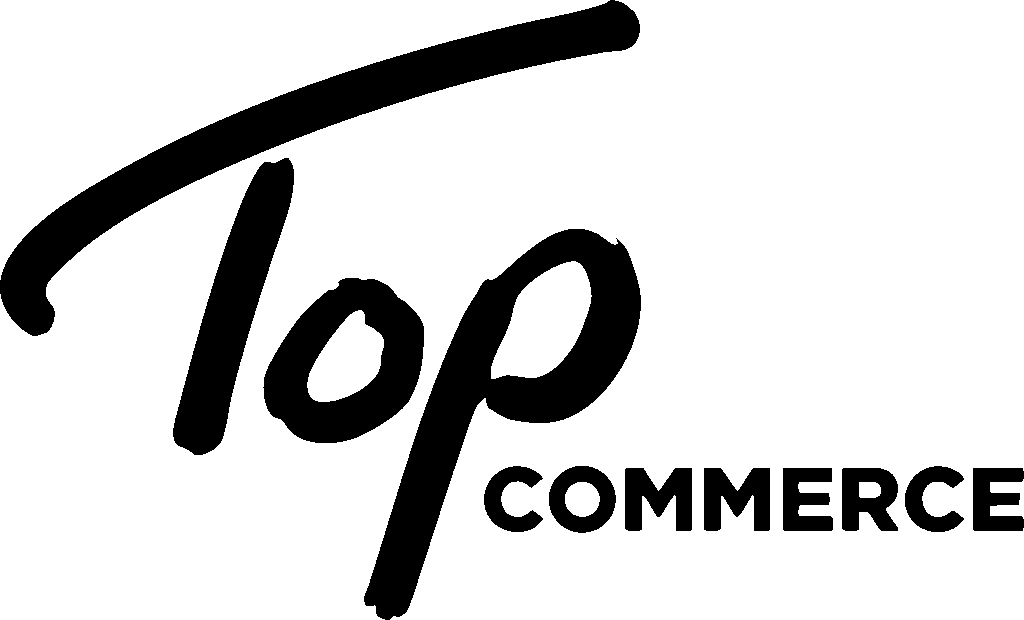Optimizing your Shopify store’s SEO in 2025 means much more than just tweaking titles or descriptions—it involves structured data (JSON‑LD), AI‑powered metadata generation, image optimization, rank tracking, sitemap management, and broken link audits. With the rise of AI‑driven search and answer engines, leveraging tools that embrace Answer Engine Optimization (AEO) and Generative Engine Optimization (GEO) has become essential.
Here are the top 10 Shopify SEO apps of 2025, based on features, usability, pricing transparency, and merchant feedback. Each summary covers who it’s best for, its core capabilities, and pricing tiers. A comparison table follows to help you choose the best fit.
1. Tiny SEO Speed Image Optimizer
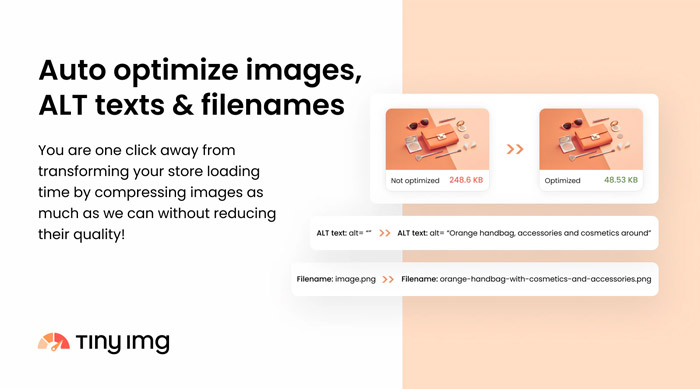
Best for: Beginners and SMBs wanting an automated, all‑in‑one SEO and image optimization solution.
TinyIMG consistently earns high praise as the most well‑rounded Shopify SEO app available in 2025. It combines aggressive image compression (up to 94% for PNGs and 54% for JPGs), bulk metadata and alt‑text editing, broken link detection, JSON‑LD structured data, lazy loading and site speed features. Its audit tool highlights technical SEO issues and directs you toward quick fixes—all without coding or technical skills.
Who it’s best for: Merchants who want to automate the time‑consuming tasks—metadata, images, structure—while keeping costs minimal.
Pricing: Offers a free tier (50 image optimizations/month, metadata bulk editing). Paid plan up to approximately $96/year (~$14/month) for higher usage and advanced features.
2. Booster SEO & Image Optimizer
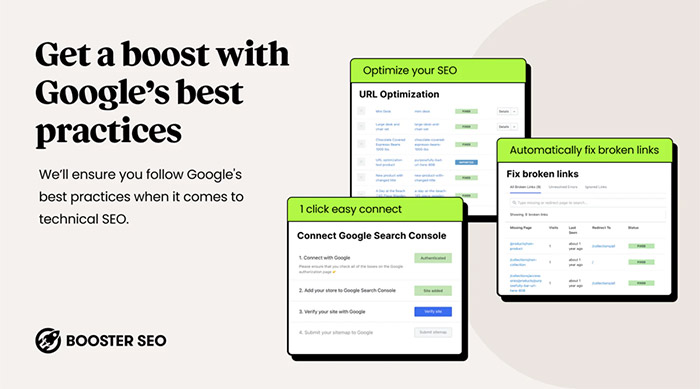
Best for: Small stores that want marketing‑style autopilot SEO with minimal manual setup.
Booster SEO delivers a seamless, autopilot experience by automatically fixing meta titles, descriptions, alt-text, image size, site URLs, and JSON‑LD markup. It routinely scans for broken links and optimizes images weekly with minimal input. Users love the intuitive dashboard and how Booster handles complex SEO tasks behind the scenes—especially helpful for non-technical merchants .
Who it’s best for: Store owners who prioritize simplicity and speed improvements without diving into granular settings.Pricing:
- Free plan with basic SEO and weekly image sync
- Pro: $39/month (or $349/year)
- Premium: $69/month (or $619/year) with full feature set.
3. Avada SEO & Image Optimizer
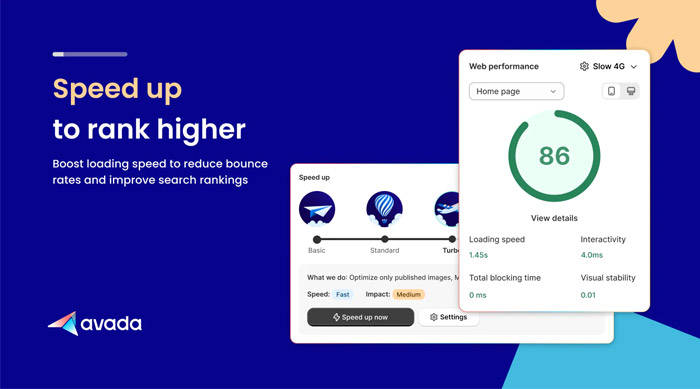
Best for: Merchants who want educational guidance and rich auditing tools.
Avada offers extensive SEO audits, AI metadata generation, image compression, URL optimization, and structured data like JSON‑LD. It stands out with its clear audit dashboard and SEO academy-style walkthroughs for fixing issues. During testing, Avada compressed PNG by ~68% and JPG by ~9%, and supports Search Console and Pinterest verification for easier site indexing .
Who it’s best for: Small to mid-sized stores where learning and transparent feedback is valuable.
Pricing: Free tier available; paid plans go up to $99/month.
4. Tapita AI SEO Optimizer
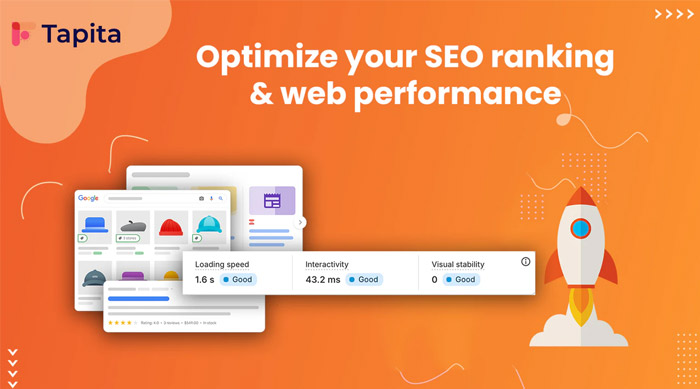
Best for: Intermediate users needing speed optimization plus keyword tools and structured data.
Tapita provides site speed performance tools, SEO audits, schema configuration, keyword research, and automated alt-text/templates. It also integrates with Google Search Console and sitemaps, giving insightful on-page optimization recommendations. The free tier is generous, and keyword tools are particularly helpful for non-technical users wanting to better target search queries .
Who it’s best for: Store owners who want SEO paired with page speed enhancements and keyword insights.
Pricing:
- Free tier: 50-page audit, 900 image compressions/month, 50 products alt & file name auto
- Basic: $9.99/month
- Standard: $29.99/month
- Advanced: $49.99/month for high‑volume stores.
5. Smart SEO (Sherpas)
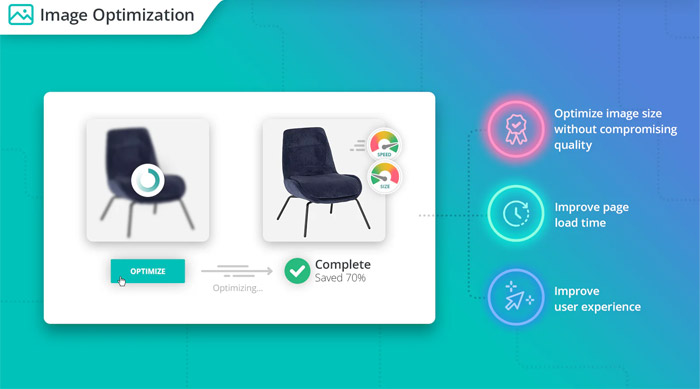
Best for: DIY merchants and agencies on a budget who want SEO essentials.
Smart SEO automates metadata creation, alt text generation, broken link monitoring, and structured data (JSON‑LD). The interface is sleek and minimalistic, focusing on performance rather than depth. Unique to Smart SEO: integrated backlink reports help you track referring domains. Image compression rates during testing were solid (PNG ~69%, JPG ~51%) .
Who it’s best for: Budget-conscious store owners seeking essential SEO automation with clean UI.
Pricing:
- Free: limited quotas (100 alt‑tags, 100 broken link scans, etc.)
- Pro: $9.99/month
- Business: $19.99/month
- Premium: $29.99/month with highest quotas and dedicated support.
6. StoreSEO (AI SEO Agent)
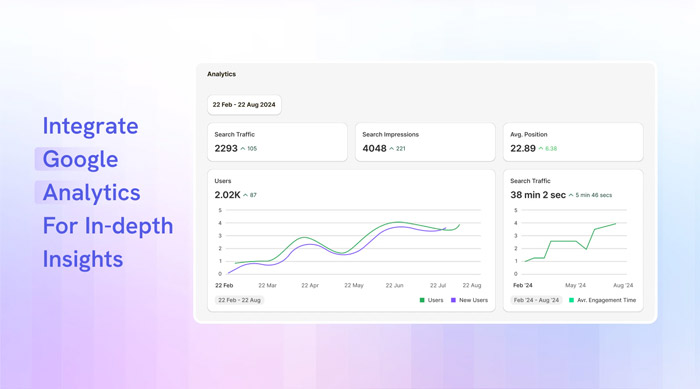
Best for: International stores needing multilingual SEO, structured data, and centralized analytics.
StoreSEO offers page scores, AI metadata suggestions, image optimization, JSON‑LD insertion, sitemap management, and integration with Google Analytics/Search Console. It also supports multilingual campaigns and auto keyphrase suggestions. Though not strongly focused on speed tools, it excels as a structured-data and performance analysis platform .
Who it’s best for: Multi-currency, multilingual stores or merchants focused on structured data and analytics-first optimization.
Pricing:
- Lite: $19.99/month (100 products, 500 image optimizations, 1,000 AI credits)
- Essential: $39.99/month
- Growth: $99.99/month (multilingual support)
- Advanced: $249.99/month (up to 50,000 AI credits).
7. SEOAnt – AI SEO & Image Optimizer
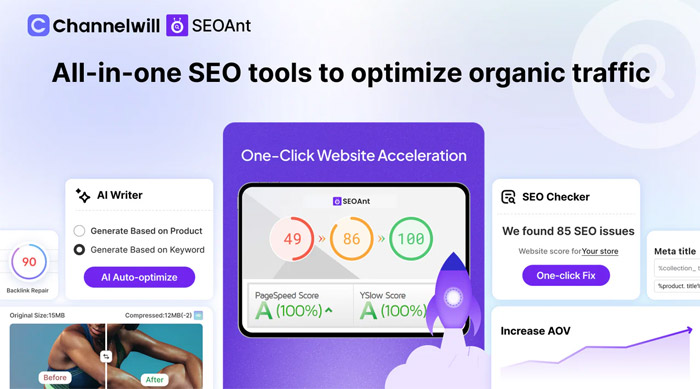
Best for: Stores seeking advanced AI-driven meta generation and competitive analytics.
SEOAnt stands out with its integrated ChatGPT AI writer (credits included monthly), AMP support, backlink suggestions, competitor keyword tracking, and automatic rank alerts. It also offers fast image compression and structured data insights. Users often highlight its AI capabilities and visually rich dashboard as differentiators .
Who it’s best for: Merchants wanting to generate content rapidly and analyze competition while monitoring keyword rankings.
Pricing: Approximately $59.99/month (or $575.90/year with discount) with full AI and analytic features .
8. Plug In SEO
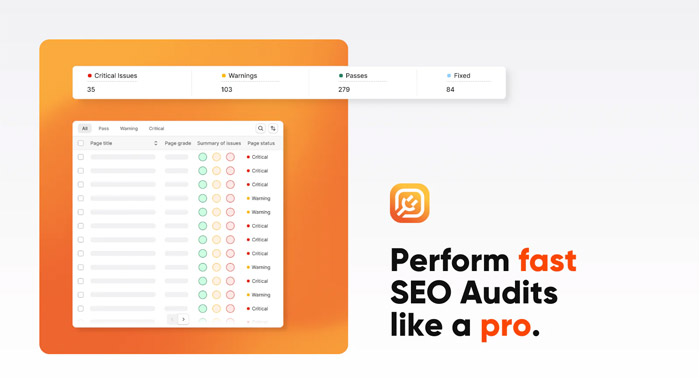
Best for: Merchants desiring a classical approach with clear audit workflows and redirect management.
Plug In SEO provides thorough audits across meta titles/descriptions, link structure, JSON‑LD markup, site speed, blog content, and redirects. While lacking extensive AI automation, it offers a transparent diagnostics process and fix suggestions, ideal for stores needing foundational audits and ongoing monitoring .
Who it’s best for: Merchants focused on audit-driven improvement and redirect management, without relying on AI.
Pricing:
- Pro Plan: $29.99/month (200 pages)
- Premium Plan: $59.99/month (unlimited pages, reports).
9. Yoast SEO
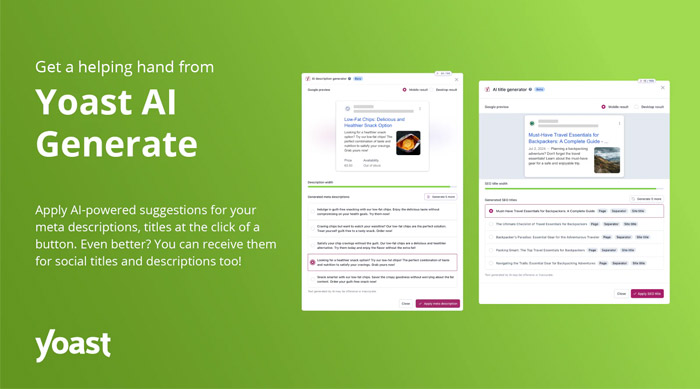
Best for: Merchants desiring a classical approach with clear audit workflows and redirect management.
Plug In SEO provides thorough audits across meta titles/descriptions, link structure, JSON‑LD markup, site speed, blog content, and redirects. While lacking extensive AI automation, it offers a transparent diagnostics process and fix suggestions, ideal for stores needing foundational audits and ongoing monitoring .
Who it’s best for: Merchants focused on audit-driven improvement and redirect management, without relying on AI.
Pricing: $19/month, with annual discount to $190/year. Free trial available.
10. SEO Expert Danny
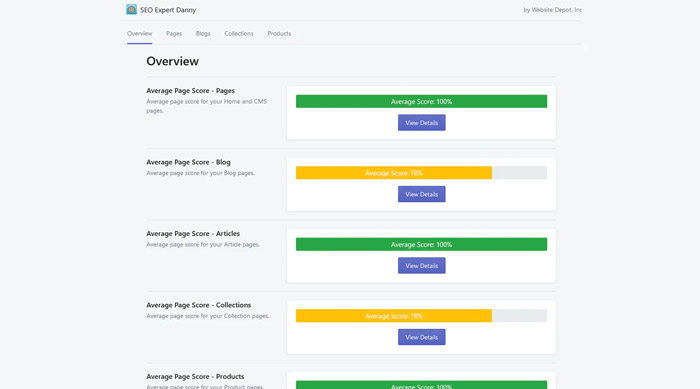
Best for: Budget-conscious merchants who want a simple, no-frills SEO checker for unlimited content types.
SEO Expert Danny is a minimalist SEO audit tool designed for Shopify merchants who want to quickly scan their product pages, collections, blogs, and CMS pages for common issues. It covers title length, missing descriptions, image alt text, and URL hygiene. While it lacks advanced features like AI-generated meta tags, JSON-LD, or structured data management, it excels in speed, affordability, and simplicity. It’s particularly handy for dropshippers or solopreneurs who don’t need deep analytics or automation but still want to ensure their store isn’t missing basic on-page SEO elements.
Who it’s best for: New Shopify store owners, small catalogs, or sellers with limited technical needs looking for a clean, cost-effective way to identify SEO gaps.Pricing: Flat $8.95/month .
Comparison Table
| App Name | Best For | Entry |
| TinyIMG | Beginners, SMB image + metadata optimizer | From $14 |
| Booster SEO | Small stores needing autopilot SEO | From $39 |
| Avada | Solo or less tech-savvy sellers | From ≈ $35 |
| Tapita AI SEO | High-volume + AI insights | From $9.99 |
| Smart SEO (Sherpas) | DIY users and agencies on a budget | From $9.99 |
| StoreSEO | International or UK stores, AI, multilingual | From $39.99 |
| SEOAnt | AI‑powered content, competitive analytics | From $29.99 |
| Plug In SEO | Traditional audit-based SEO | From $49.99 |
| Yoast SEO | Merchants used to WordPress workflows | From $19 |
| SEO Expert Danny | Very basic audits across all content types | Free |
Final Thoughts
Choosing the right SEO app for Shopify in 2025 depends on your technical comfort, store size, and whether you prefer automation or guided audits:
- TinyIMG stands out for beginners and SMBs who want image and metadata automation at excellent value.
- Booster SEO is ideal when you want higher-level automation and autopilot features without manual intervention.
- Avada and Smart SEO are both beginner‑friendly, with dashboards and helpful support.
- If content generation, multilingual support, or structured data matters, StoreSEO and Tapita are strong picks.
- Advanced users craving rich competitive intelligence and AI-powered writing will appreciate SEOAnt.
- For structured, traditional audit workflows, Plug In SEO or Yoast offer familiar interfaces.
- Lastly, SEO Expert Danny is the simplest, lowest‑cost tool for basic audits.
No SEO app alone will guarantee top rankings—you’ll still need well‑written content, backlinks, and a solid strategy. But pairing one of these top apps with best practices in content and link building can significantly boost organic traffic and performance in the AI-powered search era
FAQ
Do I need a paid SEO app for my Shopify store, or is the free version enough?
It depends on your store’s size and SEO goals. Free versions are often sufficient for small stores with under 50 products and basic needs like image optimization and metadata editing. However, if you need bulk edits, AI-generated content, structured data, multilingual SEO, or competitive insights, a paid app offers far more value and automation.
Can these SEO apps guarantee higher rankings on Google?
No app can guarantee rankings—Google’s algorithms consider many factors, including content quality, backlinks, user behavior, and site speed. SEO apps help improve technical SEO and make optimization easier, but success depends on consistent strategy and content quality.
What’s the difference between image optimization and metadata optimization?
-
Image optimization reduces file size without losing quality and adds relevant alt text, improving load speed and accessibility.
-
Metadata optimization involves editing page titles, meta descriptions, and tags to make content more search engine friendly and clickable in results.
Table of Contents
Join thousands of ambitious business owners and receive weekly tips, tools, and real-world stories to help you grow your eCommerce journey.
